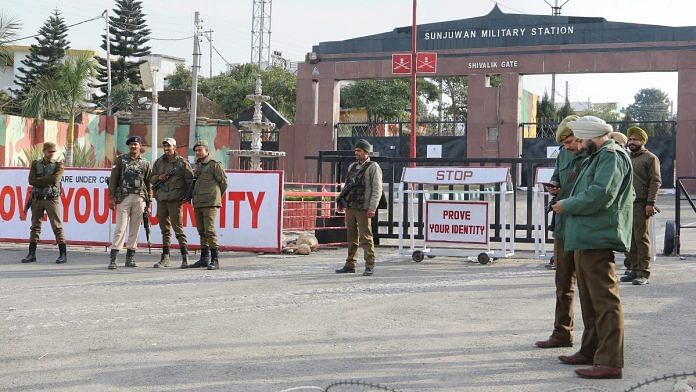No evidence of targeted attack on J&K Light Infantry yet, but there has been a series of attacks in which soldiers belonging to state have been killed.
New Delhi: With violence levels rising in Jammu and Kashmir – the attack on the Sunjuwan Military Camp in Jammu is the worst by far this year – an old, familiar trend has re-emerged. The brunt of the casualties are being borne by security personnel and their families who belong to the troubled state itself.
It is still early to determine whether the Sunjuwan attack was deliberately targeted on the Jammu and Kashmir Light Infantry (JAKLI), which mostly consists of personnel from the state itself. But it is the latest in a series of attacks that target security personnel who have been recruited for maintaining law and order.
Five of the six killed in the attack belonged to the JAKLI, while one was a civilian, the father of a soldier. Most of the injured, including a pregnant woman who delivered a baby after being shot in the back, are also related to the same unit. Four of the injured are minors.
These casualties add to the list of security forces from the state killed in recent times, with many of them identified and pursued by militants.
Previous incidents
Last year, 77 security personnel were killed in Jammu and Kashmir. Shesh Paul Vaid, director general of Jammu and Kashmir Police, told ThePrint that many of them were locals. “There is absolutely no doubt that many terror attacks have killed policemen and security personnel from the Kashmir valley. In the Jammu attack too, we have lost mostly Kashmiri jawans,” Vaid said.
In the 1990s, when militancy was as its peak, a similar pattern had emerged – former militants or locals who joined security forces were targeted by militants. The aim being to deter them from joining the mainstream or establishing a local network of supporters.
At least four policemen were killed in a powerful bomb attack by terrorist group Jaish-e-Mohammad in Sopore town in north Kashmir’s Baramulla district on 6 January. Jaish, which is the main recruiter of locals in the Valley, is also being suspected in the Sunjuwan attack.
Last year, on 16 June, attackers from Lashkar-e-Taiba (LeT) ambushed a police party on the outskirts of Anantnag district of south Kashmir and killed six policemen, including a station house officer of Achabal area, after a local commander of the same outfit was killed in an encounter. All six belonged to different districts of south Kashmir.
There have also been individual target attacks by militants on Kashmiri men serving in the Army and the police last year.
Unidentified gunmen killed Border Security Force (BSF) jawan Ramzan Parray at his residence in Hajin, Bandipora district, late evening on 27 September 2017. Three family members were also injured in the attack.
The bullet-riddled body of a young Army officer from Kashmir was found in Shopian district on 10 May 2017. The officer was identified as Lt Ummer Fayaz, a resident of Kulgam, who had come to Shopian for a wedding. Police had suspected that Fayaz was abducted and killed. He was posted in J&K itself. The incident took place in the wake of increasing tension in the Valley between civilians and security forces, following a series of videos that allegedly showed human rights excesses by the forces.
In the same month, militants had killed five policemen and two bank guards during an attack on a cash van at Phambai in Kulgam.
Security forces’ offensive approach
Security forces have killed the highest number of militants in the Kashmir Valley in nearly a decade, indicating both a rise in infiltration as well as a more offensive approach to counter-insurgency operations across the state. In all, the Jammu and Kashmir Police claimed that 200 militants were killed in 2017, of which 120 were of Pakistani origin.
Top LeT commander Junaid Mattoo was killed in June 2017 in an encounter in south Kashmir. Another Lashkar commander, Abu Dujana, was also killed in an encounter in August 2017 in Pulwama.
In December last year, Noor Mohammad Tantray, the three-feet tall Jaish commander who had kept security forces on their toes in south Kashmir, was killed in an encounter. His death was seen as a major blow to the militant outfit.



